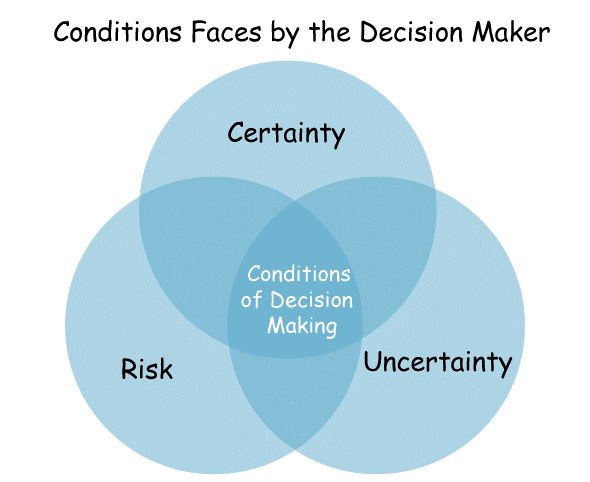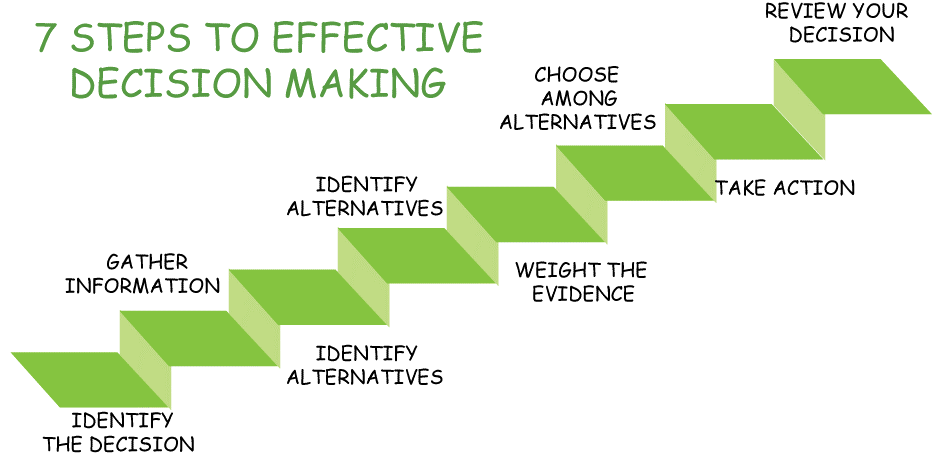Decision Making DefinitionIntroductionMaking decisions is a fundamental part of life. We make decisions and choices all the time, from the moment we get out of bed in the morning until the end of the day. Whether it is your professional or personal life, you are typically determined by your decisions. While certain actions, like brushing your teeth and bathing, are routine and nearly automatic, other actions, like setting your daily schedule, only need little decision-making. However, good decision-making abilities are crucial in professional surroundings since they will influence how you develop personally and professionally. Your choices can affect other employees and even the company's reputation, depending on your position. Many people avoid taking responsibility when faced with obstacles or while making important decisions. However, decisive individuals with a talent for making well-considered judgments at the right time are automatically viewed as leaders. You may develop close relationships with colleagues and build a peaceful environment by improving your decision-making abilities. Decision-Making: DefinitionDecision-making is picking the most appropriate course of action out of many available possibilities. It is managerial work to solve organizational issues by selecting a particular action or plan. Decision-making is an important function of management. It is a strategy for making the best rational and scientific decision. Operating decisions are the backbone of every organization. The organization's future is determined by decisions made today. 
One of the key responsibilities of management is decision-making. The manager plays a critical role in supporting their decision, as the success or failure of an organization depends on timely judgments made. Making decisions is a component of all managerial actions, such as organizing, planning, hiring, and directing. The following are some skills that help exhibit good decision-making benefits:
Decision-Making in ManagementMaking decisions involves selecting one of several potential solutions to a problem. Many hiring managers and recruiters prioritize it while searching for fresh talent because it is a highly regarded skill. Usually, an individual decision follows a step-by-step procedure, such as collecting data, weighing the advantages and disadvantages, and reviewing alternative solutions. Concept of Decision-Making
Decision-making is the process of making a selection among available alternatives. Human beings make countless decisions in everyday life. There are decisions made at every stage in business operations. It is also recognized as one of the crucial managerial duties. Decisions involve the execution of managerial tasks such as organizing, planning, hiring employees, directing, coordinating, and controlling. Decision-making is possible when two or more options are available to address a particular issue or challenge. If there's only one solution, then there is no controversy in decision-making. According to popular belief, management without a decision is an individual without a backbone. As a result, decision-making is a problem-solving strategy that involves selecting a particular course of action from among several choices. Conditions for Making DecisionsA manager may be under a variety of circumstances while making a decision. When making judgments, a manager should be aware of their current situation. The manager typically appears to be making decisions under three circumstances. They are: 
Importance of Decision-MakingMaking decisions is the foundation of business management because nothing can be accomplished without making the appropriate choice at the right moment. The following points can be used to discuss the importance of decision-making in greater depth: 
Saves both money and timeThe organization's ability to save time is a key factor in the importance of top-level decisions. Ineffective decision-making wastes a lot of time and reduces the motivation of those engaged. It is best to choose quickly to save as much time as possible. Furthermore, time is equivalent to money in terms of an organization. Therefore, wasting time is the same as wasting money. Boost Your ProductivityIf management is excellent at decision-making and makes wise decisions, it will increase the productivity of your staff on numerous occasions. One benefit of knowing the organization's direction is that employees are more willing to work. They will work with the assurance that their attempts will not be in vain. Second, no time is wasted because the management team is clear that their activities will appropriately guide their business. Utilizing Your Resources Most EffectivelyManagement must maximize resources for huge businesses with massive pools of resources. Keeping resources from running out enables your company to operate at its maximum capacity. However, it also lessens resource waste. Top-notch decision-making results from identifying where resources are needed and directing them there instead of elsewhere. Cost-effectivenessThe long-term success of your business depends on pricing your products competitively on the market. It impacts the direction of the company and the market-specific you're aiming for. The goal of decision-making is to determine the best product management and roadmap software. Therefore, there might be a lot of management dropping to make the appropriate decisions and missing the right price plans, even by a small amount. Recognize OpportunitiesThere are opportunities all around, but the key is to find them so that you can take advantage of them one day. On the other hand, the wrong decision allows possibilities to slip through your fingers. It additionally makes them seem non-existing. For example, if your company can supply a product in high demand on the market. Your organization might be unable to move in that direction or allow you to concentrate on it if you make bad or delayed decisions. Set Achievable GoalsSometimes it's more crucial to set realistic short- and long-term goals than actually to accomplish them. Since if you don't categorize your goals as attainable, no matter how hard you try, you won't be able to accomplish them. Instead, you'll be wasting your resources, time, and money. You will need strong management and great decision-making abilities to analyze your organization while keeping the vision; also, determining achievable goals. This will guarantee that you are moving in the right direction and that the places you see are not simply dead ends. Enhanced Marketing StrategiesThe initial phase in getting your business noticed is using marketing strategies. Your business will never reach its fullest potential, no matter how excellent your goods or services are, if you cannot promote your brand efficiently to your consumer base. Decision-Making and Its Importance in Problem-SolvingThere is a strong correlation between decision-making and problem-solving. The importance of decision-making lies in how it helps you choose between various options. Before deciding, it is necessary to gather all available information and weigh its pros and cons. Focusing on steps that can help make the right decisions is crucial. Process of Decision-MakingAs decision making is an ongoing and dynamic process. Everyone must follow a sequence of steps before making a decision. The decision-making process is an intellectual method that assists in determining which choice among several is the most effective. It is preferable to follow these steps to make the most practical, sensible decision possible: 
1. Identify the decisionYou understand that you have to make a decision. Make an effort to clarify the purpose of the decision you need to make. The initial step is extremely significant. 2. Gather relevant informationBefore you make a choice, collect some relevant data, including what information is required, the best sources to use, and how to obtain it. This step requires both external and internal "work." A process of self-assessment will help you find some internal information. External sources include the internet, books, other people, and other sources of information. 3. Identify the alternativesAs you gather knowledge, you'll undoubtedly come up with several potential paths of action or possibilities. You can also create new options by using your creativity and additional knowledge. 4. Weigh the evidenceUse your knowledge and feelings to visualize what it would feel like to follow up on each alternative. Decide if each option would be able to satisfy or otherwise address the demand that was defined in "Identify the Decision". You'll start to favor particular options as you go through this challenging internal process: those that seem to have a better chance of helping you achieve your goal. Then, based on your personal value system, rank the choices in order of priority. 5. Choose among alternativesYou are prepared to choose the option that seems to be the best fit for you once you have considered all the available alternatives. You can even select several alternatives. The alternative you prioritized at the top of your list after the previous step may very well be the same or similar to the option you select in this step. 6. Take actionThe solution you selected in "Choose among alternatives" can now be implemented as you prepare to take some constructive action. 7. Review your decision and its consequencesConsider the outcomes of your choice in the final step, and determine whether or not it has satisfied the need you recognized in step 1 (Identify the decision). You might wish to repeat some of the processes to reach a new option if the one you made did not satisfy the specified need. For example, you could wish to look into other options or acquire information that is more specific or slightly different. SummaryYou have seen a few advantages of decision-making in this post, which indicates why it is such a valuable ability and why it should be seen as essential for any team. Poor choices may lead to low staff morale, ultimately preventing management from achieving its goals.
Next TopicDengue Definition
|
 For Videos Join Our Youtube Channel: Join Now
For Videos Join Our Youtube Channel: Join Now
Feedback
- Send your Feedback to [email protected]
Help Others, Please Share










